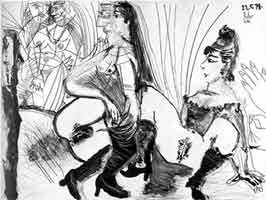
Obra de Jozef Walczak
El voluntarismo criminal y el anti-Marxismo de Mao Zedong
Mao Zedong used his Confucianist demagoguery to pay lip service to Marxist theory but contradicted it in reality at almost every important respect through his theory and actions; Maoism is not an adaptation of Marxism to Chinese reality but an eclectic mixture of nationalism, Confucianism and Stalinism; This disregard for Marxist theory necessarily conducted the Chinese Communist Party to class collaborationism, nationalism and to a complete break with historical materialism in its extreme voluntarism.
After the destruction of the proletarian Chinese Communist Party in 1925-1927 by the nationalist-bourgeois Guomingdang, to which the CCP was subjected by the orders of Stalin-Bukharin the party was forced to go to the countryside and there it filled its ranks with the peasantry. This anti-Marxist substitution of the proletariat as the vanguard of the revolution was to have important repercussions in the deformation of Marxist theory by these self-styled “communists”. It may come as a surprise that the new leadership of the CCP not only failed to recognize the responsibility of the bureaucratic leadership that had usurped power in the Soviet Union from the Bolsheviks in the massacre of the Chinese Party, and most of all that Mao continued to pay homage to Stalin (Reform our Study pg. 201). Mao was truly a Stalinist, and as a Stalinist he only knew how to implement this anti-working class deformation of Marxism, what we see in his notion of “New Democracy” which meant a joint dictatorship of several classes (On New Democracy pg. 256). But if Marxism has always held that the state is a special body created for the enforcement of the rule of a single class over the rest of society, there can be no such “joint dictatorship”; this is class collaborationism, class treason. What brought about the acceptance of Marxism in countries like China was its anti-imperialist or anti-colonialist character and that the leadership of the CCP was looking to produce a
bourgeois-democratic revolution. Of course in the “anti-colonialist” and “anti-imperialist” bandwagon we can find all shades of opportunist scum, like bourgeois-nationalists, national-socialist right wingers, and of course, Stalinists and Maoists. The fact that the most conscious members of the proletariat were destroyed by Stalinist class collaboration left the doors open to the CCP Maoists leading the peasantry to military victory, what produced a deformed worker state from its inception, overthrowing feudal and capitalist class relations (most of the bourgeoisie left to Taiwan or the U.S.). Lenin had pointed out that the peasantry is not an independent force but must either follow the bourgeoisie or the proletariat. The way forward to socialism in colonies was developed as a strategy by Lenin in 1917, and it was the recognition that the proletariat was the only revolutionary class and that it would need to lean on the peasantry to gain power because of the many strings that tied the weak domestic bourgeoisie to imperialism (April Theses pg. 3-15). We can also find absurd and extreme voluntarism and negation of Marxism in Mao with his complete disregard for the development of productive forces, having the nerve to declare possible the construction of socialism in one country which was also a very backward agrarian society. Maoism has proved to be an extremely voluntaristic, class-collaborationist, nationalist and anti-working class theory and practice that has little to do with Marxism; Marxists should unmask it at every moment, showing it as it is a self-serving program that serves to protect the interests of the conservative bureaucracy over the backs of the working masses. Marxist theory will call against the bureaucratic usurpation of political power and will always take into account the development of productive forces, and defend the class independence of the proletariat.






